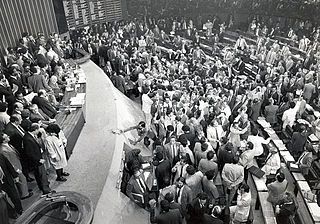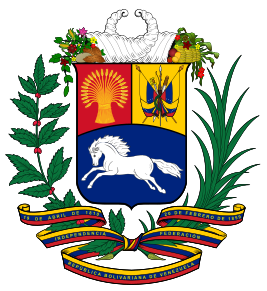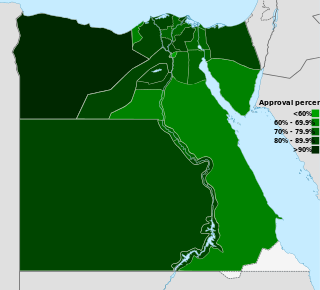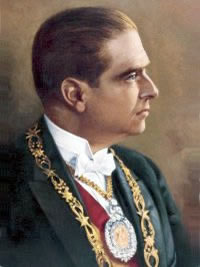A constitutional amendment is a modification of the constitution of a polity, organization or other type of entity. Amendments are often interwoven into the relevant sections of an existing constitution, directly altering the text. Conversely, they can be appended to the constitution as supplemental additions (codicils), thus changing the frame of government without altering the existing text of the document.

The Congress of the Republic of Colombia is the name given to Colombia's bicameral national legislature.

During its independent political history, Brazil has had seven constitutions. The most recent was ratified on October 5, 1988.

The Constitution of the Bolivarian Republic of Venezuela is the current and twenty-sixth constitution of Venezuela. It was drafted in mid-1999 by a constitutional assembly that had been created by popular referendum. Adopted in December 1999, it replaced the 1961 Constitution, the longest-serving in Venezuelan history. It was primarily promoted by then President of Venezuela Hugo Chávez and thereafter received strong backing from diverse sectors, including figures involved in promulgating the 1961 constitution such as Luis Miquilena and Carlos Andrés Pérez. Chávez and his followers (chavistas) refer to the 1999 document as the "Constitución Bolivariana" because they assert that it is ideologically descended from the thinking and political philosophy of Simón Bolívar and Bolivarianism. Since the creation of the Constituent National Assembly in August 2017, the Bolivarian government has declared the 1999 constitution suspended until a new constitution is created.

The Australian republic referendum held on 6 November 1999 was a two-question referendum to amend the Constitution of Australia. The first question asked whether Australia should become a republic with a President appointed by Parliament following a bi-partisan appointment model which had been approved by a half-elected, half-appointed Constitutional Convention held in Canberra in February 1998. The second question, generally deemed to be far less important politically, asked whether Australia should alter the Constitution to insert a preamble. For some years opinion polls had suggested that a majority of the electorate favoured a republic. Nonetheless, the republic referendum was defeated due to division among republicans on the method proposed for selection of the president and dissident republicans subsequently supporting the no campaign.

The Italian Parliament is the national parliament of the Italian Republic. The Parliament is the representative body of Italian citizens and is the successor to the Parliament of the Kingdom of Sardinia (1848–1861) and the Parliament of the Kingdom of Italy (1861–1946). It is a bicameral legislature with 945 elected members and a small number of unelected members (parlamentari). It is composed of the Chamber of Deputies, with 630 members (deputati) elected on a national basis, and the Senate of the Republic, with 315 members (senatori) elected on a regional basis, plus a small number of senators for life, either appointed or ex officio. The two houses are independent from one another and never meet jointly except under circumstances specified by the Constitution.

The Constitution of Colombia, better known as the Constitution of 1991, is the current governing document of the Republic of Colombia. Promulgated on July 4, 1991, it replaced the Constitution of 1886. It is Colombia's ninth constitution since 1830. See a timeline of all previous constitutions and amendments here. It has recently been called the Constitution of Rights.

A constitutional referendum was held in Bolivia on 25 January 2009, postponed from the initially planned dates of 4 May 2008 and then 7 December 2008. Drafted by the Constituent Assembly in 2007, the new constitution was approved in the referendum according to an exit poll by Ipsos Apoyo for La Razón and ATB, a Bolivian television network. Furthermore, it required early elections to be held on 6 December 2009.

The Bolivian Constituent Assembly, convened on August 6, 2006 in Sucre, with the purpose of drafting a new national constitution by December 14, 2007; extended from the original deadline of August 6, 2007. The Assembly approved the new Political Constitution of the State on 9 December 2007. It was put to a national referendum held on 25 January 2009, and went into force on 7 February 2009.

A constitutional referendum was held in Niger on 4 August 2009. The referendum proposed the dissolution of the Fifth Republic and the creation of the Sixth Republic under a fully presidential system of government, offering a yes or no vote on the suspension of the constitution and granting President Mamadou Tandja a three-year interim government, during which the constitution of the Sixth Republic would be formulated. On 20 June, the Constitutional Court declared the plan illegal, but Tandja subsequently assumed emergency powers and dissolved the Court. The events surrounding this election led to a constitutional crisis.

Bolivia has had seventeen constitutions, including the present one, since its foundation in 1825.

A constitutional referendum was held in American Samoa on November 2, 2010, on the same day of the United States House of Representatives election and American Samoan general election.

A constitutional referendum was held in Egypt on 19 March 2011, following the 2011 Egyptian revolution. More than 14 million (77%) were in favour, while around 4 million (23%) opposed the changes; 41% of 45 million eligible voters turned out to vote.

A referendum on electing a Constitutional Assembly was held in Colombia on 27 May 1990 alongside presidential elections. The proposal was approved by 96% of voters. A Constitutional Assembly was later elected in December 1990 and produced the 1991 constitution.

A fifteen-part constitutional referendum was held in Colombia on 25 October 2003. Whilst all fifteen proposals were approved by voters, only one question had a sufficient numbers of votes to pass the 25% quorum requirement.
A referendum is a direct vote in which an entire electorate is asked to either accept or reject a particular proposal. This article summarises referendum laws and practice in various countries.

A constitutional referendum was scheduled to be held in Myanmar (Burma) in May 2015. If approved, the proposed reforms would have come into effect after the general elections in November. After most of the proposed amendments to the constitution were discarded, the referendum was postponed.

A constitutional referendum was held in Peru on 9 December 2018 alongside the second round of gubernatorial elections.

Parliamentary elections were held in the Federated States of Micronesia on 5 March 2019, alongside a referendum on calling a Constitutional Convention. All 14 seats in Congress were up for election, and all 13 incumbents standing for re-election were returned to Congress.

















